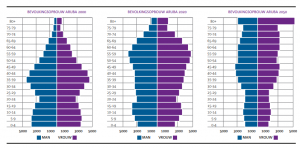(Oranjestad)—In an annual report for 2022, the Board of Advisory has recently elaborated on the challenges that the aging problem on Aruba may bring. On the other hand, the emerging challenges of the economic demand are particularly related to the structure of care.
Inspired by a problem created in the labor market, the Board of Advisory has indicated that there is an increasing pressure that will emerge on the economic growth. Aging—and add to that the shortage in the market—may make the economy grow slower, or may even decrease growth all-together.

Another concern in this aspect is that the shortage may bring detrimental consequences to the loan service for touristic products, with negative effects on the quality of product delivery and eventually, rates.
The entity remarks that coming out of the demographic evolution, in a participation of employment of equal age, the number of unemployed people will increase.
Despite the problem of aging, the growth of GDP per capita will probably depend more on the development of work productivity, and in the long run, this can be the force behind economic growth. The question remains if this also counts for Aruba.
They have highlighted that considering the type of labor offers in the non-diversified economy on the island, the shortage in the labor market cannot be accommodated for an increase in level of education and labor productivity in the Aruban community.
Also, because of the effects of aging within the labor market and the relationship between workers and those unemployed, this can create deteriorating effects in the business environment in the long run. For this reason, the entity indicates that it is very important to realize productive reforms and investments in benefit of the potential growth in the economy.
According to the board, we cannot just focus on the challenges of the demographic development on the side of economic offers, but we also have to consider the demand. This way, there will be—with the push of the aging population—a bigger demand in care and as a consequence, a demand for workers in the health sector.
This development does not stand on its own, but goes hand-in-hand with a complete modification of the assistive structure, the association formation and the investments in the installation of care.
In its advisory report of 2019 titled “Policy on the elderly – care and welfare: a turnaround!”, the Board of Social Economics (SER) pleads for a complete change in the way Aruba generally regards and treats the structure of care, policies and the well-being of the elderly.
SER concluded that achieving quality and attention for the elderly is predetermined by the rate of health as well as the active participation from the entire population from birth till death.
They have stated that while there are no other visions taking place for health, care and aging, maintaining the sustainability of health care funds from AZV and SVB will remain a challenge. Prevention, promotion for a healthy life style and public information serve as basic elements of a health policy, according to SER.
SER has also made a series of concrete recommendations to the government to guarantee good quality of care for the elderly. These recommendations include support for informal care, participation of the elderly and the quality of care.
A report published in 2022 on the efficacy and effectiveness of medical care in Aruba and commissioned by the Ministry of Health and Sports, affirms that there is a need for a short-term emergency plan for the care of elderly adults and that in the sector of residential care, there is an emergency for which actions must be taken.
With this, the conclusions from the research carried out in 2018 by the Department of Public Health Aruba (DVG) regarding long-term medical care in Aruba, confirms a further increase in pressure and importance for action.
The continuous growth of the group of people whose average age is increasing has an impact on public health and care. Looking at the high concentration of spending in health among the highest age groups, the problem of aging will bring an increase in total spending on care.
This is mainly caused by this group that most often have chronic conditions or even several at once. The increase in the cost of medical care due to the growing demand increases the upward pressure on the financing of AZV and the quality of care it provides in the future.
In terms of treatments and benefits for older adults, the problem of aging has important consequences. As a result of the doubling aging population, not only will there be more elderly adults who received the AOV benefit, but an elderly adult will be receiving this benefit for a longer period of time. Because of this, there is a need for more financial resources to guarantee this payment in the future.
Because the benefits need to be paid to a part of the population that increasingly becomes bigger, if there is no change in policy, the fund for the elderly will exhaust within a decade.




















